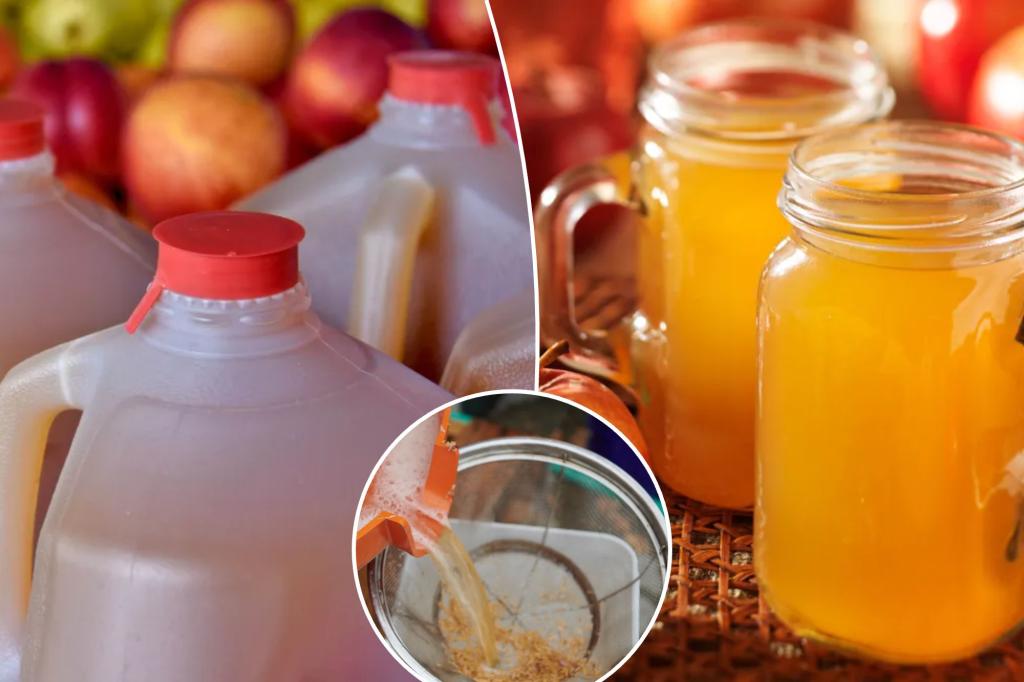Local health authorities are warning about the dangers of consuming unpasteurized apple cider, as it may contain harmful bacteria that can make people severely ill, especially vulnerable populations. This type of apple cider is typically unfiltered and unpasteurized, giving it a murky and golden appearance. Many apple orchards do not take the time to pasteurize their cider because it is not required. The Fulton County Health Department in Illinois highlighted that foodborne illnesses can have especially severe consequences for infants, young children, pregnant women, older adults, and individuals with weakened immune systems. In 2015, unpasteurized apple cider from a private dairy farm in Illinois caused a gastrointestinal illness outbreak, sickening over 100 people from multiple states and counties.
One couple who became ill after consuming the unpasteurized apple cider at a fall festival in Illinois described their symptoms as “violent.” The cider was found to contain cryptosporidium, a parasite that can cause watery diarrhea. Health officials noted that cattle, which can carry cryptosporidium, were in close proximity to the cider press. Most juices sold in the US are pasteurized, meaning they have been heated to kill harmful bacteria, yeast, and molds. The FDA requires packaged unpasteurized juices in certain locations to carry a warning label about the potential risks, but juices sold at apple orchards, farmers markets, roadside stands, or juice bars are not mandated to have this labeling.
Consumers are encouraged to be cautious and ask vendors about pasteurization if they have any doubts about the safety of the apple cider they are purchasing. Healthline Nutrition Editor Lisa Valente, a registered dietitian, emphasized the importance of ensuring the safety of any juice or cider that is consumed. She also noted that farmers markets provide a unique shopping experience that combines social elements with purchasing fresh produce. It is crucial to be aware of the risks associated with consuming unpasteurized apple cider, as it can lead to severe illnesses, especially for vulnerable populations.
Unpasteurized apple cider can be a breeding ground for harmful bacteria like cryptosporidium, which can cause serious illness in individuals, particularly infants, young children, pregnant women, older adults, and those with weakened immune systems. The 2015 outbreak caused by unpasteurized apple cider in Illinois serves as a cautionary tale for consumers about the potential dangers of consuming raw, unfiltered cider. Health officials have stressed the importance of pasteurization to kill off harmful pathogens and prevent outbreaks of foodborne illness. In order to stay safe, it is recommended to purchase pasteurized juices or inquire about the pasteurization process before consuming any unpasteurized beverages.
The FDA regulations require certain packages of unpasteurized juice to carry warning labels, alerting consumers to the potential risks associated with consuming the product. However, juices sold by the glass at various venues like apple orchards, farmers markets, and juice bars may not have these warnings, making it important for consumers to be proactive in ensuring the safety of the products they consume. Home pasteurization is also recommended as a precautionary measure to eliminate harmful bacteria, ensuring that the juice is safe for consumption. By being informed and taking necessary precautions, consumers can protect themselves and their families from the risks associated with consuming unpasteurized apple cider.
It is crucial for consumers to be aware of the potential risks associated with unpasteurized apple cider and other raw beverages. Health authorities are issuing warnings about the dangers of consuming unfiltered and unpasteurized cider, which may contain harmful bacteria that can lead to severe illnesses. In the interest of public health, it is important for individuals to educate themselves about the importance of pasteurization and to take steps to ensure the safety of the foods and beverages they consume. By understanding the risks and being proactive in asking questions about the pasteurization process, consumers can protect themselves and their loved ones from foodborne illnesses and other health risks associated with consuming raw beverages.


